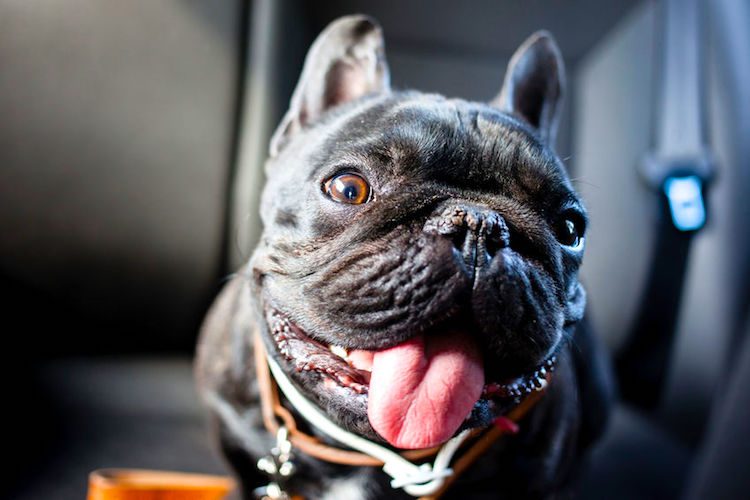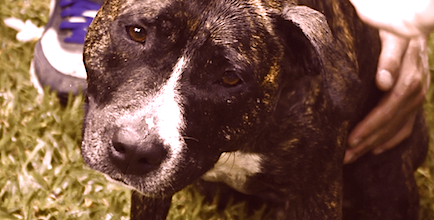French Bulldog Puppies Breed Profile: Essential Facts
Frenchies are playful, alert, affectionate and intelligent with a comical personality and a sweet nature. In other words, they are awesome!
French Bulldog

Don’t leave your pet’s safety to chance
Sign up for Petful recall alerts today.

Key Characteristics of French Bulldog Puppies
The French Bulldog, or Frenchie, is small, compact, and muscular. These popular dogs have a square-shaped head with a broad muzzle and a black nose.
- Distinct underbite
- Batlike ears
- Wider at the front than the back, making them appear pear-shaped
- Loose skin forming wrinkles, particularly around the head and shoulders
- Short tails that are either straight or corkscrew and taper to a fine point
Where French Bulldogs Came From
Despite the name, this breed originated in Nottingham, England, in the 19th century.
- Initial Purpose: French Bulldogs were bred as an alternative to the heavier and larger English Bulldog. They were particularly popular with lace-makers of that period.
- Industrial Revolution: When the Industrial Revolution hit, many artisans moved to France, taking their new, smaller breed of bulldog with them.
- Evolution: The French developed the breed further, notably in the shape of the ears. The newer Frenchies had the batlike ears that we see today, while the original breed had ears that were rose-shaped.
Gradually, as Americans visited France, they became enamored with the breed, and so the Frenchie made its way to the United States. In 1897, the Frenchie was exhibited at the Westminster Kennel Club Dog Show, although it was not yet an American Kennel Club (AKC)–approved breed, which happened a year later.
Frenchies continued to be wildly popular among Americans until after World War I, when their numbers and popularity started to decline.
By 1940, the French Bulldog was considered to be a rare breed, and only 100 were registered with the AKC. Decades later, in the 1980s, the Frenchie staged a comeback.

How Friendly Are French Bulldogs?
In her book The French Bulldog, author Muriel P. Lee gushes, “What the Frenchie is best at is being a companion, and this is what he was bred for. He will gladly share the sofa for an evening of television or even better, share your bed at night.”
Frenchies are said to be playful, alert, affectionate, and intelligent with a comical personality and a sweet nature. They are curious and can get themselves into trouble if not watched. In general, they do well with strangers and other pets and love nothing more than to be with their humans.
- Personality Traits: Playful, alert, affectionate, intelligent
- Interaction: Do well with strangers and other pets, love being with their humans
- Watchfulness: Curious and can get into trouble if not watched
French Bulldogs do need a firm hand — they can develop small dog syndrome. They also require companionship. You shouldn’t get one and then ignore them or leave them alone for many hours.

Are French Bulldog Puppies the Right Dog for You?
Exercise Needs
LowLOW: Frenchies do well in an apartment or a house with a yard. Engage yours in play and take them for walks regularly to avoid obesity and to keep them from becoming destructively bored.
- Temperature Sensitivity: Note that Frenchies do not do well in temperature extremes — either hot or cold — because of their fine coats.
- Hot Weather: Avoid taking your Frenchie for long walks on hot days, and be sure to bundle them up on cold ones.
Grooming Needs
LowLOW: French Bulldogs don’t require more than weekly brushings to maintain their coat. Bathe as needed, which means once a month or less. Also, perform regular maintenance on teeth and nails.
Health Problems
HighHIGH: This breed is prone to a number of medical concerns:
- Birthing Issues: Often require cesarean sections
- Breathing/Respiratory Problems: Prone to brachycephalic syndrome
- Spinal Disorders/Disc Diseases
- Joint Diseases
- Heart Defects
Enlist the aid of a good veterinarian who can help you monitor your French Bulldog for any potential health problems. Be alert for any signs of overheating, and avoid vigorous exercise on hot days.
More Stats About French Bulldogs
Friendliness: ★★★★☆
Ease of Training: ★★★★☆
Barking/Howling: ★★★☆☆
Shedding: ★★★☆☆
Tolerate Being Alone: ★☆☆☆☆
Very Good With Kids: ★★★★☆
Here’s another look at this fascinating dog breed:
How to Adopt French Bulldog Puppies
Many Frenchies out there need good homes! So check Petful’s pet adoption search now to see if the perfect one is waiting for you.
If you decide to go through a breeder, please do your homework and don’t be an accidental supporter of puppy mills.
Related Dog Breed Profiles You May Like
- Weimaraner Breed Profile: Essential Facts
- Boston Terrier Puppies Breed Profile: Essential Facts
- Lagotto Romagnolo Puppies Breed Profile: Essential Facts
- Rottweiler Breed Profile: Essential Facts
- Russell Terrier Breed Profile: Essential Facts
Frequently Asked Questions (FAQ)
Are French Bulldogs a good house pet?
Yes, French Bulldogs make excellent house pets. They are affectionate, low-energy, and adaptable, making them great companions for apartments and small homes.
Why are Frenchie dogs so expensive?
French Bulldogs are expensive due to high breeding costs, small litter sizes, and the need for artificial insemination and C-sections. A well-bred Frenchie puppy typically costs between $3,000 and $8,000.
Is a Frenchie a Pitbull?
No, French Bulldogs are not Pitbulls. They are a small companion breed developed from Bulldogs and other small terriers, while Pitbulls are muscular working dogs with a different lineage.
Is a French Bulldog a bully dog?
Yes, French Bulldogs are part of the bully breed group, which includes various bulldog and mastiff-type breeds, but they are bred for companionship rather than guarding or working purposes.
References
- “French Bulldog.” American Kennel Club. https://www.akc.org/dog-breeds/french-bulldog/.
- Lee, Muriel P. The French Bulldog. i5 Publishing. 2012. https://books.google.com/books?id=zMwKBgAAQBAJ&printsec=frontcover#v=onepage&q&f=false.
- “French Bulldog Health and Conformation.” French Bull Dog Club of America. https://frenchbulldogclub.org/health/.
- Saben, Susanne. French Bulldog: The French Bulldog Bible. DYM Worldwide Publishers. 2017. https://www.google.com/books/edition/French_Bulldog_The_French_Bulldog_Bible/jxI9DgAAQBAJ?hl=en&gbpv=0.








